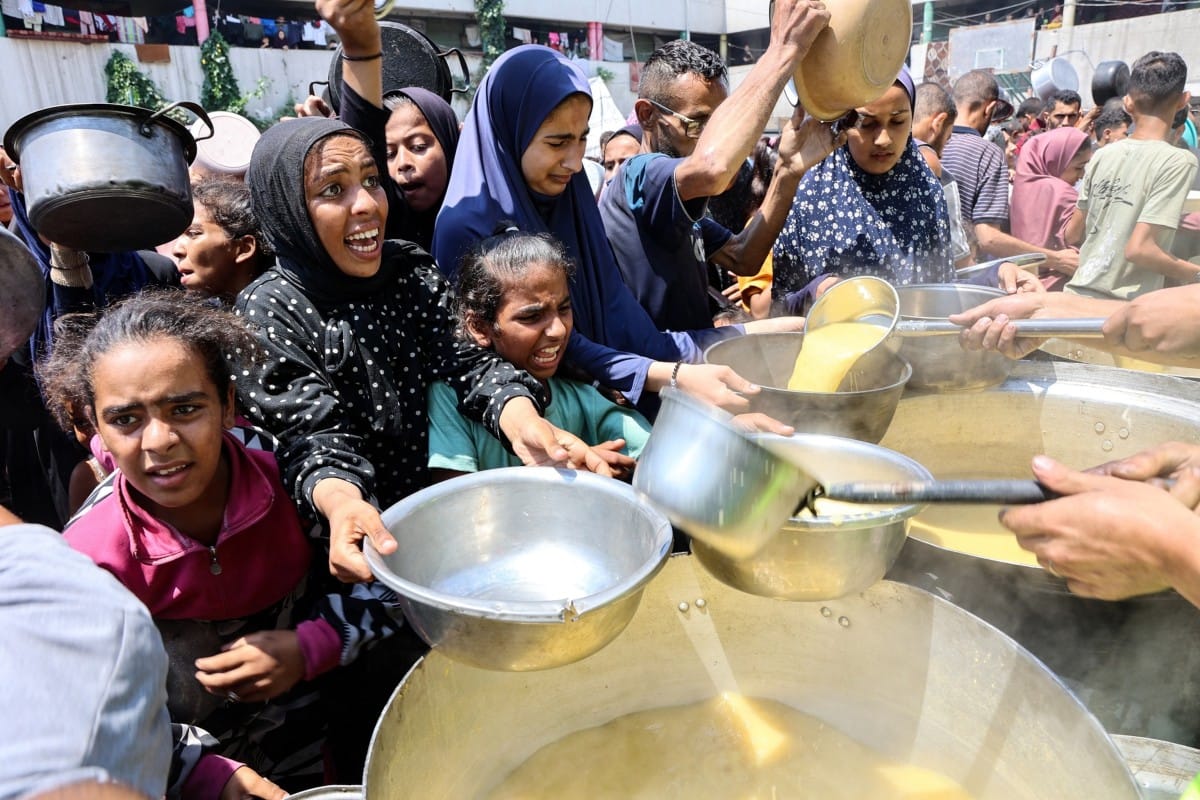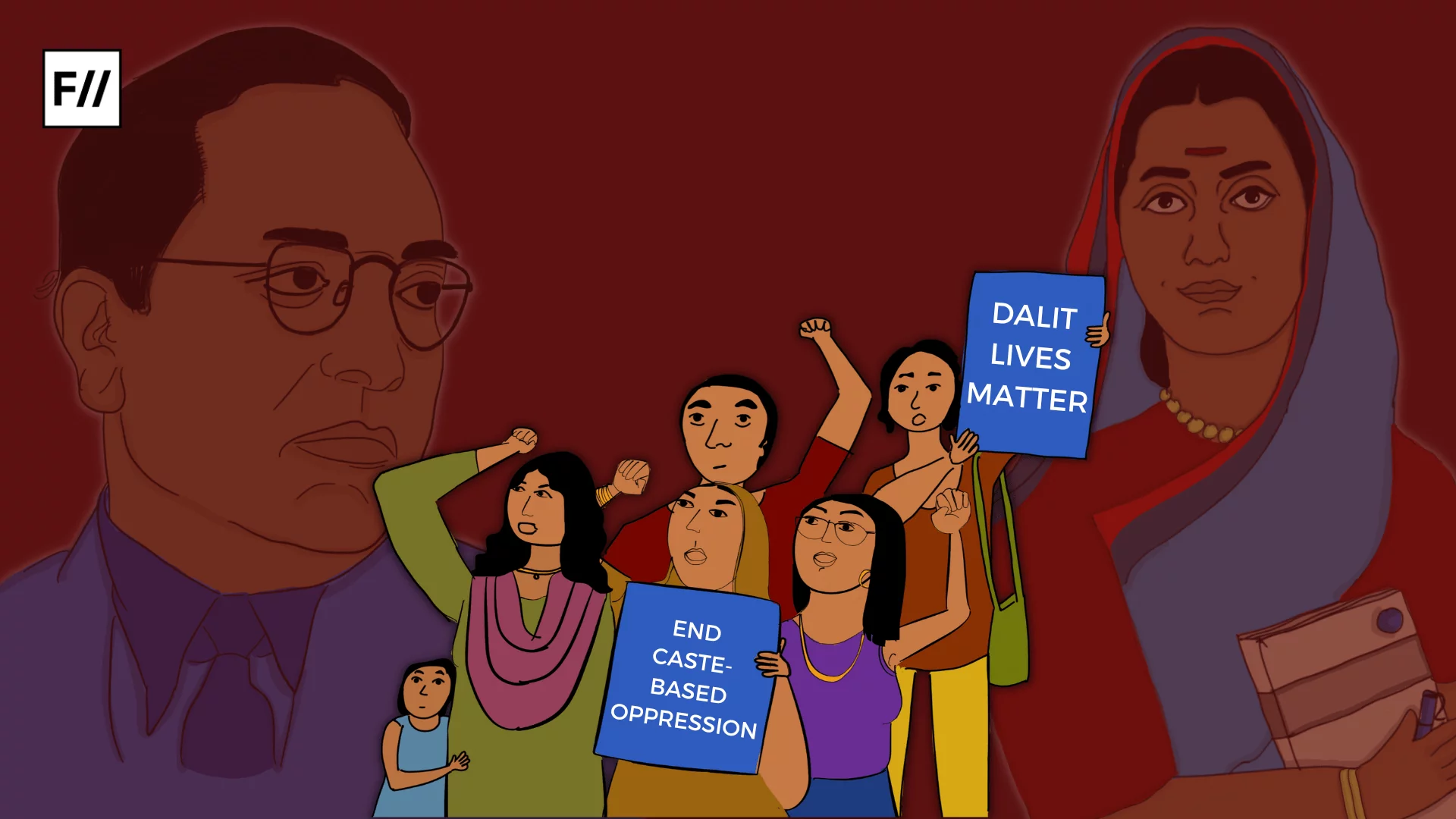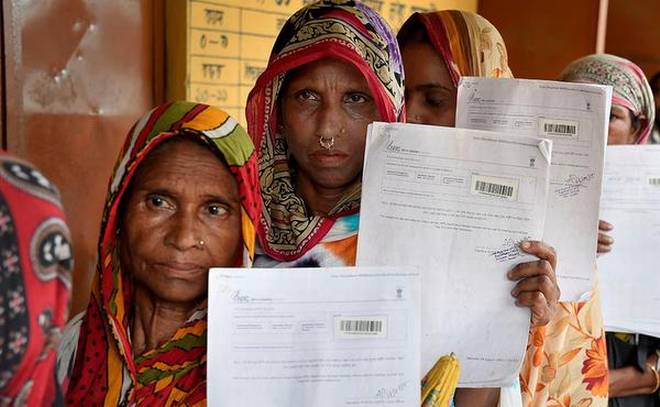Photographer Ahmed-Al-Arini recently took a chilling photo of a starving infant in his mother’s arms in Gaza, demonstrating the malnourishment that an entire population is facing, from the youngest to the oldest. News outlets covering the ongoing genocide show ghastly details like one in three Palestinian citizens going days without food and the Zionist forces having numerically killed more people just in the food queues of Gaza, than the combined number of Israelis killed on October 7, 2023.
Noteworthy is the fact that the precarity which Palestinian civilians in Gaza are being subjected to has been manually created by a rogue-state, which believes in ethnic cleansing as a means of conquest. Alongside Israel, historical evidences show that colonial and imperialist forces have always used similar measures for territorial expansion. One may wonder what actually brings a state to forcefully exert itself upon marginalised areas, and always have a tendency for conquests, the answer to which may subliminally be linked to the patriarchal institution of control.
Sociologist Sylvia Walby argues about Violence and the State being two major edicts that consolidate Patriarchy, in her concept of the Six Structures of Patriarchy. The hyper masculine body always looks for an identity or an institution to control, and while in domestic spaces, it finds a woman for the same, it looks for a marginalised population or a smaller territory for asserting dominance in a political sphere, challenging territorial autonomy and identity development through policing, surveillance and violence like bombing, persecution, mass-starvation, etc. When one scrolls through the pages of history, one stumbles across despots and dictators, enlightened under patriarchal standards of fiefdom, succumb to the same measures for annexation.
A brief historical imagery of resource-control used as a subjugation tool
‘I hate Indians. They are a beastly people with a beastly religion. The famine was their own fault for breeding like rabbits.‘
These words were said by the former UK Prime Minister in context of the 1943 Bengal Famine, a phenomenon associated with a colonial hermeneutic that killed an estimated 3 million people. When Israeli PM Benjamin Netanyahu claimed the aid cuts in Gaza to be an ‘anti-Semite conspiracy‘ and directed all the blame towards the Hamas, the aforementioned quote started bearing striking similarities. What could have been an isolated incident started having a pattern of historical repetitions, and reflected the lack of accountability of a Government, that uses masculine dominance at the core of its strategies.
At its core, the Great Bengal Famine of 1943 does serve as a great example of how mass-starvation is an extension of an imperialist or fascist governing body, that prioritises war and conquest over its people. In her book, Churchill’s Secret War: The British Empire and the Ravaging of India during World II, Madhushree Mukherjee provides several harrowing accounts of how the British colonial forces diverted their attention to an armament race, ignoring and often enabling the resource-shortage of the Indian natives. Moreover, scholars have also demonstrated how famines were painted as propaganda to save the image of colonial forces.
The cutting off of basic resources and mass-starvation has always served as a major role in subjugating territories and populations.
The cutting off of basic resources and mass-starvation has always served as a major role in subjugating territories and populations. The Romans had used it as early as 146 BCE in order to destroy Carthage and in the modern world, Hitler’s ‘Hungerplan‘ starving 4.2 million Soviet citizens to death during World War II, Britain’s mass civilian relocation program for the communists of Malaya in the 1950s, Pol Pot’s 1977 ‘Year Zero‘ effort et al serve as reminders of the same.
The process of resource manipulation and other plunder methods exhibited in megalomaniac states have a similarity to economic coercion in the patriarchal society, and is a great medium for demonstrating the similarities in imperialist or fascist states and patriarchal institutions.
How patriarchy and state coercion work alike in the case of Gaza
Judith Butler challenges the idea of a universal patriarchy and shows how patriarchal power is actually performed through institutions, like the state, which dictate narratives through laws and policies. If this theory is taken a bit further, one can establish the fact that all kinds of state control over marginalised identities and the statist ignorance regarding the same is a mere reflection of the patriarchal nature of socio-sexual control. An article by The Conversation reveals how men in the West are drawn to authoritarian and exclusive politics than women from the same age group, who mostly tend to be drawn to Socialist or inclusionary ideals. This further illustrates gendered control as an epicenter for authoritarianism, with lived experiences of patriarchal privilege and trauma deciding the politics of men and women respectively.
The unfolding events of the Palestinian genocide in Gaza by the Zionists, serve as a great point of comparison with the historical marginalisation of women and other gender identities. In the case of Palestinians, the biopolitics has assigned the least importance to their lives, implying that their kind is subjected to death without much significance given to the same. On the other hand, the Israelis have been given a respectability status, as any kind of violence from them is met with a defensive stance from dominant powers like the US. In the same context, aeons of violence has been normalised against women without intervention, although any difficulty towards an influential population of the gender on the other end of the spectrum is met with monumental shifts in laws and policies, as often demonstrated in reproductive rights like abortion and birth control.
‘If men could get pregnant, abortion would be a sacrament.‘
-Floryence Kennedy
To further bridge the gap between statist and patriarchal control, one may critically analyse the control of resources in both of the above. This article has already spoken about resource control being a biopolitical strategy to assert dominance over smaller nation-states and their populations. Through the analytical lens of feminism, one might note gendered economic coercion at its base. Referring to actions takenby partners to control the victim’s acquisition, use and maintenance of economic resources and activities, such behaviours increase the dependency of the victim on the perpetrator for economic security and well-being, making it more difficult to leave abusive relationships.
Property and inheritance laws have inherently made it impossible for women to have access to resources and wealth, which in turn forces women to be dependent on the patriarchy for livelihood, often forcing them into lives of toil, depression and invisible labor, thanks to their economic handicap which is impeccably similar to the condition of third-world nations in the context of world politics, as shown by several studies in International Relations. In the context of Gaza, constant bombings have ensured the depletion of their natural resources. Moreover, hijacking aid sent by welfare committees to Gazan civilians, ensure that the people be dependent on the occupying forces for survival, which provides the former with proper field for takeover.
The fallacy of neoliberal ‘inclusion’ and its after effects
With the end of the 20th and the advent of the 21st century, Globalisation rose to great heights and Neoliberalism started to gain footing as a dominant force throughout the world. Soon after, liberal parties like the Democrats in the US and the Labour Party in the UK started inculcating ‘inclusive’ and ‘tolerant’ ideas about race, class, gender, sexuality, etc. On the other hand, their ideas of development were now definitively centered around free markets, industries, urban beautification, etc. While people started being manipulated into accepting these new changes as ‘ideal’, they failed to understand the superficiality of such politics, resulting in neo-fascism taking over under the guise of neoliberal development, which has been demonstrated by several scholars in the East and the West.
The Liberal idea of gender inclusion or feminism is just a form of Pinkwashing or Pink Capitalism, than a revolutionary stride taken towards reforms for the same. It appropriates a tokenistic identity of “tolerance” as market strategies and excuses intersectional violence under the same. Companies might display a ‘You Go Girl‘ poster for International Women’s Day or colour their offices in shades of rainbow for Pride Month, throwing them away once the stipulated date and time is over. In a more dangerous light, an IDF soldier had displayed an ‘In The Name of Love‘ banner before going on a killing spree in Gaza.
Superficial politics of the aforementioned kind exposes itself in more than one way(s). While it talks about equality and non-violence, it ignores an ongoing genocide for the sake of marketing alliances and for establishing soft-power. On the other hand, its idea of identity politics falls short since it ignores problems of most communities other than the quintessential white bourgeois class. Unless a class-conscious and intersectional political system is set up, one which wouldn’t be a flag-bearer of world hegemony, gendered identities and marginalised populations shall always remain precariously positioned and the current geo-political scenario talks plenty about the same.








